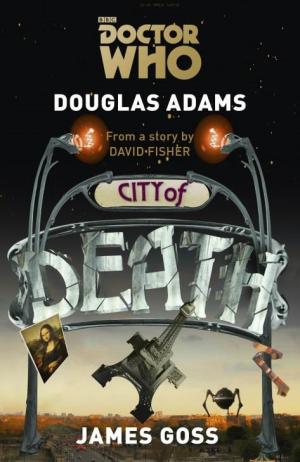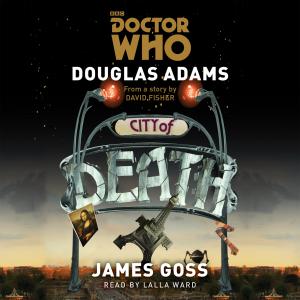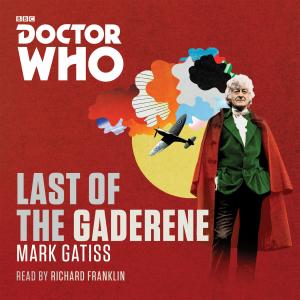Doctor Who: The early Adventures Domain of the Voord
Written By: Andrew Smith
Directed By: Ken Bentley
Cast
William Russell (Ian Chesterton), Carole Ann Ford (Susan),
Daisy Ashford (Amyra), Andrew Dickens (Jonas Kaan/Tarlak), Andrew Bone (Pan Vexel/Nebrin)
Although I didn’t know much about Big Finish’s Early Adventures range when it was announced, I was curious to see how different it would be to the Companion Chronicle’s, as the two ranges are relatively similar. I found this review took me far longer than most to write, simply due to the large emphasis on narrative rather than action, which for me somewhat diminishes the impact of a story in many situations. However, as you will see from my impressions, I did enjoy the adventure in spite of its slight flaws.
The use of the original 1963 version of the opening theme tune, as heard in the Hartnell era of the show, is a nostalgic touch and a fitting opening, giving way to a serene view. Russell’s hypnotic voiceover sets the scene of tranquillity which is shattered by the familiar wheezing groaning sound of the Tardis. Here there is an interesting use of repeated sections of the take-off sequence to indicate that the time capsule is, at this point in the show’s history, a very erratic time machine, never truly under the control of its occupants.
The Doctor, Ian, Susan and Barbra discover that they have landed in the middle of a fleet of ships that, they realise later, are ready not to fight, but for flight from the alien race that has decimated so many of their number in a relatively short space of time. At the flagship of the fleet, The Doctor and his companions meet Admiral Jonas Kaan after encountering his daughter, Amyra. The two citizens of the planet Hydra, a world covered by a large expanse of ocean, are unconvinced that the Doctor and his companions are just travellers. However, when the flotilla is attacked they are more than glad of the strangers’ services. Ian dives down to help as part of a squad sent to identify a contact under water, with The Doctor taking over from a Sonar operator.
With the Voord submersible craft attacking with superior numbers and firepower and the Tardis lost when the ship it was on is sunk, things begin to look pretty dire. However, that is not the end of the problems for the travellers as the flagship suffers the same fate.
The closure of the first episode comes in what might be considered a classic fashion, with the listener left wondering if The Doctor and his companions will escape from the situations they have become embroiled in. The second episode opens with this in mind, keeping the emotional rollercoaster up for a good while with room for the gaps to be filled in by the imagination as the characters seem to go out of one scrape only to be thrust into another.
Episodes three and four see the travellers make their way to the main land mass of the planet, encountering the Voord army and resistance groups. The climax to the story is a fitting one and similar to those in other stories of the era, thus making it feel more at home in that part of the show’s history. The final lines, as spoken by Amyra, set up the story that follows to be another interesting excursion.
This particular adventure is mostly linear, but that doesn’t stop it from throwing in a few twists and turns along the way. The scenes progress through a number of locations from on board ships, to an occupied city under militaristic rule, to the shores and crashing waves of the ocean to name a few, with all feeling fleshed out and well-structured.
In terms of presentation, the story works similarly to those of the companion chronicles, with the characters and a narrator, consisting of multiple voices, interweaving relatively seamlessly. This is not as frustrating as it might sound, as the lines that fill in the gaps between actual speech, along with the descriptions, are usually enough to solve any discrepancies.
The musical score that accompanies the various scenes is reminiscent of the show’s past, with little instrumentation. What it lacks in this field, however, it makes up for in the fact that it is, at least until the final episode, far from an invasive score – it does not make its presence obvious to the listener, merely serving to underpin various events and emerge when necessary.
The sound design is of good quality, mostly consisting of ambience and movement effects. However, that does not detract from the presentation of the story, in fact having fewer sounds in a story styled like this is helpful – building an atmosphere whilst not being too intrusive. A prime example of this is during the diving sequences, where the effects used to signify the character is wearing a helmet are appropriately claustrophobic, achieving the goal of making the listener feel as if they are surrounded by the ocean’s depths.
While the pacing is a little slow at times, it is with good reason as tension is built gradually through a series of interlinked events. With most of the first two episodes being set on board a ship, the lethargic feeling is offset by the nostalgia of the show’s classic tight corridors and cramped spaces given off by the closed setting.
The fact that this story references an earlier adventure (specifically The Keys of Marinus) is a good method of cementing it into the rest of the Doctor Who canon. Far from limiting those who can make links, the in-story explanations make up for the fact that some may not have encountered the Serial or the titular villain before. The Voord are portrayed as a formidable foe, with very little that can defeat them for the majority of the story.
Casting-wise, the aforementioned Voord are voiced well, with their cold warrior attitude coming through in what relative little they say as well as their actions. The other characters fighting to rid the setting of the Voord occupation forces are also well cast. Russell’s portrayals of Ian and The Doctor are noteworthy simply for the fact that the characters can be told apart. This is also the case with others in the cast who take up more than one role, with it having little impact on intelligibility of the story.
Over all, this is a good adventure with a well-crafted script and atmospheric sound and vocal effects. However, the repeated use of the same or similar musical cues as well as scenes sometimes not transitioning as smoothly as they ought to can be a bit of a drag at times. I’d say for those who liked the Companion Chronicles and wanted more expanded stories, this might be a good way forward. For those unfamiliar with the companion chronicles, it might be a good idea to visit those first to understand the narrative style. The writing in this story captures the Hartnell era’s atmosphere well and even though it might feel a little long at times, it’s worth the wait to see how all the loose ends are tied up at the story’s conclusion. Even though I’m more a fan of the full cast dramas with little or no narrator to speak of, I still found this to be a well thought out and enjoyable adventure.










